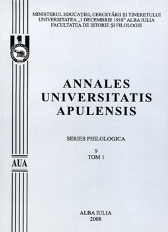Noutatea – semn distinctiv al modernităţii
Novelty as a Distinctive Sign of Modernity
Author(s): Elena PrusSubject(s): Literary Texts
Published by: Universitatea »1 Decembrie 1918« Alba Iulia
Keywords: modernity and its origins; interpretations of modernity; human condition; set of values
Summary/Abstract: The French Revolution is not only a reference point and a defining event for modern society in France and in Europe altogether but also for a different new ethics and aesthetics (Victor Hugo : « La Révolution, Toute la Révolution, voilà la source de la littérature du XIXe siècle »). The year 1789 was chosen by the historians of ideas as an inaugurating data for modernity, as an « état d’esprit mythe ou morale », an emblematic year for the instalment of the Enlightenment and the Human Rights, a decisive moment for a new definition of the Human Being. The fact that the famous fight between the Ancients and the Moderns had been launched towards the end of the 17th century, long before the Revolution, is not unimportant. Detaching themselves from the autors of the Antiquity, the Modernes cultivated the French spirit, fighting for national value, thus opening the way towards the Enlightenment. Taking as a starting point the discontinuous experience of time, space and causality owed to the new means of perception proposed by capitalism, Charles Baudelaire, one of the first creators who developed and theorized the notion of modernity, confers it a different acceptation, a very ambiguous and conflicting one. These pages develop a fine analysis of the baudelarian conception on modernity. Their author also presents and comments several points of view on this concept: (1) Modernity as put into relation with a certain type of human condition, an existential and a social one (Sergiu Pavlicencu); (2) Modernity seen as a traditional opposition between the ancient and the new (Meschonnic, Nouss); (3) Modernity, as a set of values, is the equivalent of the spirit of time (Henri Meschonnic).
Journal: Annales Universitatis Apulensis. Series Philologica
- Issue Year: 9/2008
- Issue No: 1
- Page Range: 95-98
- Page Count: 4
- Language: Romanian

